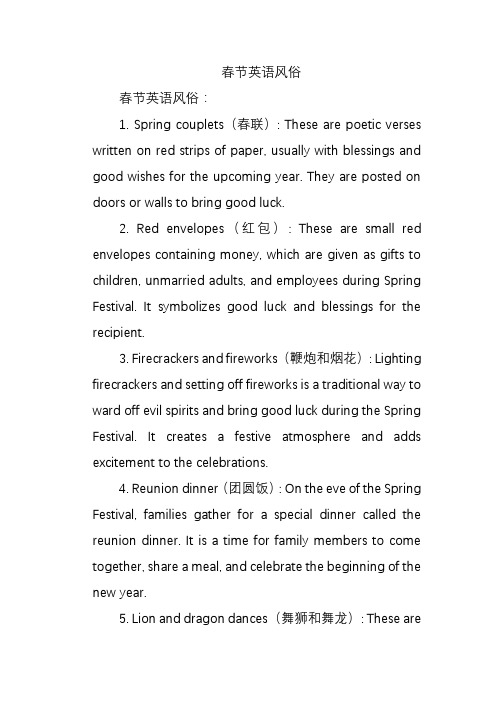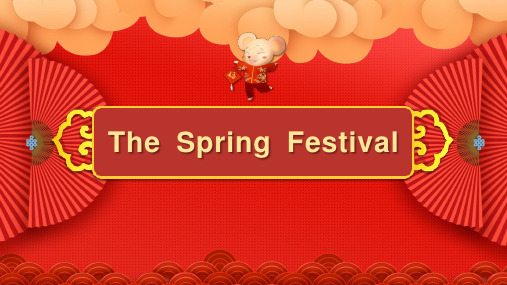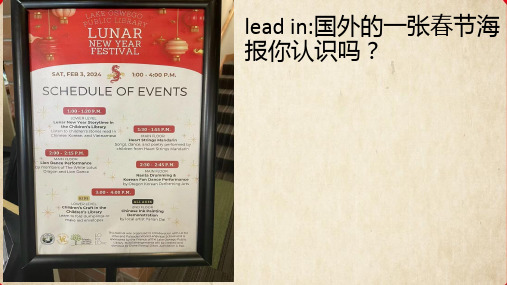春节习俗(英文版)
春节英语风俗

春节英语风俗春节英语风俗:1. Spring couplets(春联): These are poetic verses written on red strips of paper, usually with blessings and good wishes for the upcoming year. They are posted on doors or walls to bring good luck.2. Red envelopes(红包): These are small red envelopes containing money, which are given as gifts to children, unmarried adults, and employees during Spring Festival. It symbolizes good luck and blessings for the recipient.3. Firecrackers and fireworks(鞭炮和烟花): Lighting firecrackers and setting off fireworks is a traditional way to ward off evil spirits and bring good luck during the Spring Festival. It creates a festive atmosphere and adds excitement to the celebrations.4. Reunion dinner(团圆饭): On the eve of the Spring Festival, families gather for a special dinner called the reunion dinner. It is a time for family members to come together, share a meal, and celebrate the beginning of the new year.5. Lion and dragon dances(舞狮和舞龙): These aretraditional performances where dancers dress up as lions or dragons and perform lively dances accompanied by drumming and music. It is believed to bring good luck and drive away evil spirits.6. Temple fairs(庙会): During the Spring Festival, temporary fairs are set up around temples where people can enjoy various activities such as shopping, eating traditional snacks, watching performances, and playing games.。
关于新年的风俗英语

关于新年的风俗英语1、touch off the firecracker 放鞭炮例句:Many people would touch off firecrackers at New Year.许多中国人在新年时放鞭炮2、post new year's scrolls 贴春联例句:We will put up posters on their doors and walls.我们将在门上和墙上贴春联。
3、New Year's Money for Children 给孩子压岁钱例句:Adult usually give lucky money to children during Spring Festival.大人通不需要长靴常在春节期间给孩子们压岁钱。
4、Eat dumplings 吃饺子例句: We eat jiaozi and baozi sometimes. 我们有时也吃饺子和包子。
5、Eat new year's Eve dinner 吃年夜饭例句:We will eat new year's Eve dinner together. 我们将一起吃年夜饭。
6、clean up the room 收拾屋子例句:I'll do your shopping, clean up the house, and cook your dinner for you. 我会帮你买东西,收拾屋子,替你做晚饭。
7、Pay New Year call 拜年例句:I'll pay a New Year call to my uncle today. 今天我要去叔叔家拜年。
8、stay up late or all night on New Year's Eve 守岁迎新年例句:We must stay up to see the new year in. 我们得守岁迎接新年。
用英语表达春节习俗

⽤英语表达春节习俗⽤英语表达春节习俗(精选13篇) 春节的习俗因地域、民族、⽂化、经济条件的影响,呈现出巨⼤的差异性,也铸就了丰富多彩的传统⽂化。
我们要发扬光⼤这种优秀的传统⽂化,推动⽂化⾛出中国,融⼊世界。
怎样⽤英语告诉外国朋友春节的传统习俗?下⾯是⼩编整理的⽤英语表达春节习俗(精选13篇),希望对⼤家有帮助。
⽤英语表达春节习俗篇1 Chinese Spring Festival celebrating the end of winter and the warmth of spring. It began in the last day of the lunar year, end in the 15th day of lunar New Year, also is the Lantern Festival. During the Spring Festival, people use red lantern and Spring Festival couplets decorate a house, put on all kinds of colored clothes, often visit friends and relatives or together eat dumplings, fish, meat and other delicious food. The children are looking forward to receiving red envelope money, and together they play each other the fireworks, with happy. Street with dragon and lion dance and some other carnival activities, CCTV will held the grand Spring Festival gala. 中国的春节庆祝冬天的结束和温暖春天的来临。
春节的风俗英语加翻译6到8句

春节的风俗英语加翻译1. 送红包 (Giving Red Envelopes)In the Chinese New Year tradition, elders give red envelopes containing money to children and singles as a symbol of good luck and prosperity.传统中国春节习俗中,长辈们会给孩子和单身者送红包,寓意着好运与繁荣。
2. 吃团圆饭 (Having Reunion Dinner)On the Eve of Chinese New Year, families gather to have a reunion dinner, which symbolizes unity and prosperity for the coming year.在中国新年的前夕,家人聚在一起吃团圆饭,象征着家庭团结和来年的繁荣。
3. 贴春联 (Hanging Spring Couplets)Families hang red spring couplets with auspicious messages on their doors to bring good luck and drive away evil spirits.家庭会在门上贴上红色含吉祥寓意的春联,以带来好运和驱赶邪灵。
4. 看舞龙舞狮 (Watching Dragon and Lion Dances)Dragon and lion dances are performed during the Chinese New Year to bring good luck and prosperity.春节期间会表演舞龙舞狮,以带来好运和繁荣。
5. 放烟花爆竹 (Setting off Fireworks)Setting off fireworks and firecrackers is believed to drive away evil spirits and welcome the new year with a bang.放烟花爆竹被认为可以驱散邪灵,热闹迎接新的一年。
春节习俗英文版带翻译

Family Reunion (团圆)
One of the most important aspects of Chinese New Year is the reunion of family members. Many people travel long distancesto be with their loved ones during this special time. The tradition of family reunion represents the importance of maintaining close relationships and honoring familial ties.
在中国新年期间,人们会放烟花和爆竹来驱赶邪灵,带来好运。巨大的声响和明亮的灯光也被认为能够迎接新的一年,营造节日气氛。
Lucky Money (压岁钱)
Children receive lucky money in red envelopes from their elders as a symbol of good fortune and blessings for the new year. It is a way of passing on good wishes and blessings to the younger generation.
Chinese New Year, also known as the Spring Festival, is the most important and widely celebrated holiday in China. It is a time for families to come together, honor their ancestors, and welcome the arrival of the new year. The festival is rich in traditions and customs that have been passed down through generations. In this article, we will explore some of the most popular Chinese New Year customs and their significance.
有关春节习俗英文介绍

02 Customs of the Spring Festival
1. The spring festival transportation (春运)
提起春运,人们首先出现在脑海的印象就是人 多拥挤,票难买 When it comes to Spring Festival travel, the first thing that comes to mind is that people are crowded and tickets are hard to buy.
There are many legends about the origin of the Spring Festival. One legend goes that there was an extremely cruel beast named “Nian”, which had a very big mouth that would hurt people once a year on the new year eve. People were very scared.
In addition to pasting paper-cuts on windows, it is common for Chinese to paste the character “fu(福)”on walls or doors. “Fu” shows people’s yearning toward a good life. Some people even invert the character “fu” means "fu" arrive in Chinese.
3. Sweeping the Dust(扫尘)
“Dust” is homophonic with “chen”( 尘 )in Chinese , which means old and past. This custom shows a good wish of putting away old things to welcome a new life. Before the New Year comes, people will completely clean the inside and outside of their house.
春节习俗作文英文版

春节习俗作文英文版英文:As a Chinese person, I am very familiar with the customs and traditions of the Spring Festival, also known as Chinese New Year. This is the most important and festive holiday in China, and it is a time for family reunions, delicious food, and joyful celebrations.One of the most important customs during the Spring Festival is the reunion dinner on the eve of the Lunar New Year. This is a time when family members from near and far come together to enjoy a lavish meal and catch up with each other. The dinner usually includes traditional dishes such as fish, dumplings, and niangao (New Year cake), each of which has symbolic meanings for prosperity and good luck in the coming year.Another common tradition is the giving and receiving of red envelopes, or hongbao, which are filled with money andgiven to children and unmarried adults as a symbol of good fortune and blessings. As a child, I always looked forwardto receiving hongbao from my relatives, and it was always exciting to see how much money I would get.During the Spring Festival, it is also customary to clean the house thoroughly to sweep away any bad luck and make way for good fortune. This is also a time for new clothes, as wearing new outfits symbolizes a fresh startand a new beginning for the year ahead.In addition to these customs, there are also various traditional activities and performances, such as dragon and lion dances, fireworks, and the famous CCTV New Year's Gala. These cultural activities add to the festive atmosphere and bring joy and excitement to the holiday.中文:作为中国人,我非常熟悉春节的习俗和传统,也被称为中国新年。
春节习俗英文版ppt

春节习 俗
the Spring Festival customs and traditions
on New Year’s Eve
at/during Chinese/Lunar New Year at/during the Spring Festival
正月初三 the third day of
正月初四
大年初四,三羊开泰。灶王爷要查户口, 恭迎灶神回民间。相传大年初四灶王爷 要点查户口,所以家家户户都要守在家 里,因此也不宜远出,准备丰富的果品, 焚香点烛并施放鞭炮,以示恭迎。
Welcome the God of Kitchen
正月初五
• 按民间习俗是五路财神的生日,因此要 迎接财神进家,保佑自家新的一年财源 滚滚、年年有余,同时自然也是送走“穷” 的日子,故有“送穷出门”一说。同时, 这一天又俗称“破五”,意思是之前几天 的诸多禁忌至此就结束了。
收红包 get/receive lucky money/red envelopes
drumming 打鼓
舞扇子 fan dance
节 日 活 动
festival activities
正月初一 the first day of Chinese New Year
压岁钱 pocket money 正月初一是“鸡日”,原名“元旦”,“元”的本意为 “头”,后引申为“开始”。这一天是一年的头一天, 春季的头一天,正月的头一天,所以称为“三元”; 因为这一天还是岁之朝,月之朝,日之朝,所以又 称“三朝”;又因为它是第一个朔日,所以又称“元 朔”,正月初一还有上日、正朝、三朔、三始等别称, 意即年、月、日三者的开始。
农历正月初三,又称为“猪日”。自 秦汉以来,传统的看法是正月初一日 为鸡日(Rooster Day),初二日为狗日, 初三日为猪日,初四日为羊日,初五 日为牛日(Ox Day),初六日为马日,初 七日为人日(Human Day)。汉族民间传 说这是因为女娲创造万物生灵的时候, 先造的六畜,后造的人,因此初一到 初六都是六畜之日。因此人们习惯在 这一天里不杀猪,如果当日天气好, 则当年的猪会长得膘肥体壮,主人家 自然喜上眉梢。
- 1、下载文档前请自行甄别文档内容的完整性,平台不提供额外的编辑、内容补充、找答案等附加服务。
- 2、"仅部分预览"的文档,不可在线预览部分如存在完整性等问题,可反馈申请退款(可完整预览的文档不适用该条件!)。
- 3、如文档侵犯您的权益,请联系客服反馈,我们会尽快为您处理(人工客服工作时间:9:00-18:30)。
创作编号:GB8878185555334563BT9125XW创作者:凤呜大王*春节习俗从农历正月初一开始的节庆活动可谓丰富多彩,多种多样。
A series of colorful celebration activities begin on the first day of the first lunar month.春节过了以后,就是在过去中国的农村里边,文艺的活动逐渐地展开了,有各种的文艺节目,像我们现在看到的北京花会一样,高跷、旱船,另外就是唱戏。
After the Spring Festival, all kinds of entertainment programs used to be given in the rural areas in China. Justlike the flower exhibition in Beijing now, the entertainment programs include walking on stilt s, taking a boat on ground and operas.不管是城里人,还是在农村,人们都要做的一件事就是拜年。
民间流行的拜年活动先是从家里开始的。
No matter in the city or in the countryside, all the people will do one thing that is to extend Spring Festival greetings. This activity begins at first between family members.一般是我们晚辈要给长辈拜年,比如给父母和父母的兄弟姐妹,大爷、大妈等拜年。
Normally we will extend our Spring Festival greetings toour elders, such as our parents, uncles and aunts.亲戚之间在春节期间走动,有互拜平安的意思。
Relatives will drop each other a visit during the Spring Festival to give their best wishes.给亲戚拜年,出门之后就作揖、问安,说点吉祥话,恭喜过年呐,恭喜发财呀,说点吉祥话,预示着第二年有个好的,这就是新一年来了以后有好运。
To drop a Spring Festival visit is to give your new year greetings when you are out. Have a luck talk. Happy new year! May you come into a good fortune! A luck talk can bring luck to people in the new year.身体非常重要,所以春节的问候往往加上"身体健康"。
Health is very important. So new greetings normally have "Good health!"万事如意,心想事成。
Hope everything goes your way. May you succeed at/in whatever you try.事业有成!Have a successful career!drop a Spring Festival visit拜年a luck talk 吉祥话除了以往的到家里拜年,或寄贺年卡,近年来,人们也开始通过电话、电子邮件和手机短信拜年。
The traditional way ofextending Spring Festival greetings includes to drop a visit or to send new year cards. In recent years, people began to use telephone, email and sms to extend their Spring Festival wishes.虽然拜年的方式变化了,但对孩子们来讲,有一件事是不变的,那就是拜年时长辈们会给压岁钱,因为压岁钱多是放在红纸袋里的,所以人们也称之为"红包"。
Although people have different ways of extending the Spring Festival wishes now, for children, one thing still remains unchanged. This is, when they pay a Spring Festival visit to their elders, elders will give them Yasuiqian, i.e. gift money.Since Yasuiqian is money put into a small red paper envelope, people also call it "red bag/envelope/packet". 一般是这样,家里给压岁钱就是给小孩子。
磕头拜年,父母给压岁钱。
Normally, our elders give us children new year money. We kowtow to them and give them our best wishes. They will give us new year money. 其实这个"岁"呢,就是那个鬼鬼祟祟的"祟",原来不是这个年岁的岁,它是一个谐音,就是祛除这个"鬼祟之气"、"晦气","霉运"。
于是就给点压岁钱。
实际上最早不是钱,它是一些象征性的物,那么后来呢,就给点钱,不管多少,有那么个意思。
Actually, "sui" in yasuiqian has a homonym which means evil spirit. Yasuiqian is to get rid of this evil spiritand bad luck. So people give some money to bring good luck. In fact, at first people did not give money but other symbolic gifts. Then, they give money. No matter how big or small the amount is, it has a symbolic meaning.candies 糖果sunflower seeds 瓜子Yasuiqian = gift money = red bag 红包农历正月初十过后,人们便开始准备庆祝元宵节的活动。
元宵节是正月十五,是过年的另一个高潮。
赏灯和吃元宵是元宵节活动的两个主要内容。
这一天,人们在夜里悬挂彩灯猜灯谜,一起吃顿丰富的晚餐来庆祝。
元宵节赏灯活动中的猜谜游戏,充满了智慧和趣味。
After the 10th day of the first lunar month calendar, people begin to celebrate Yuanxiao Festival/the Lantern Festival. Yuanxiao Festival is the 15th day of the first lunar month, another climax during Spring Festival celebration. Watching lanterns and eating Yuanxiao are two main activities for Xuanxiao Festival celebration. On this day, people go to guess riddles on lanterns at night and have a big dinner for celebration. The riddle games are full of wisdom and fun.过年时,言行要特别谨慎,因为中国人希望一年的开始能够事事顺利,有个好兆头。
所以春节时期有许多禁忌。
有些话、有些事是不能说,不能做的。
During the Spring Festival, one must be extremely careful in his or her acts and words. Because Chinese people want to have a nice start at the beginning of each year. Therefore there are many taboos during the Spring Festival. Some words should not be spoken and some things should not be done.春节里边有很多禁忌,你初一这一天最好不要扫地,要扫地的话,你要从门口往门里扫,从外往里扫,因为这些垃圾(被人们认为)都是财富。
如果这一天打碎了东西,你不能责备孩子们,你得说"岁岁平安"。
打碎了嘛,"碎"跟那个年岁的"岁"正好谐音,岁岁平安。
如果小孩子不注意说了这种骂人的话啊什么,叫做"童言无忌"。
There are many taboo s during the Spring Festival. One should not sweep on the first day of the first lunar month. If you sweep on that day, you should sweep from outdoors to indoors, but not from indoors to outdoors. If a child breaks something on that day, you should not blame him or her. You should say "To break is great for next year!" Break in Chinese has a homonym which means Year. If a child says something bad, it is "Children’s words are no taboos."Yuanxiao Festival/the Lantern Festival 元宵节To break is great for next year! 碎碎平安Children’s words are no taboos 童言无忌创作编号:GB8878185555334563BT9125XW创作者:凤呜大王*。
